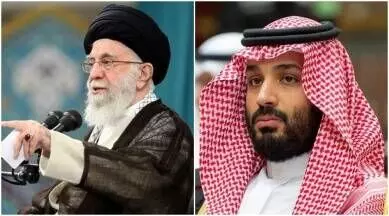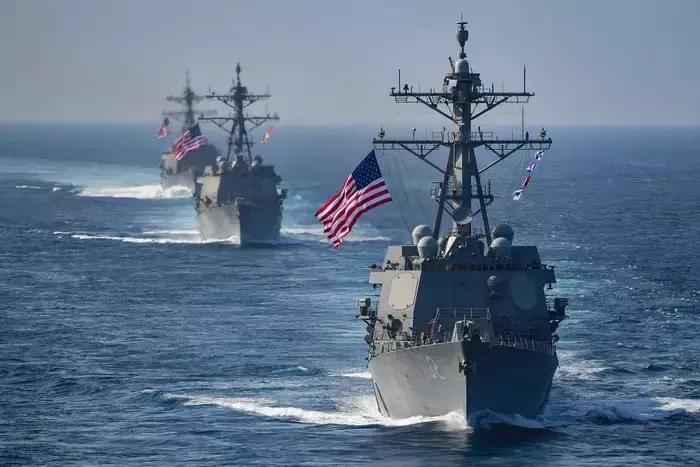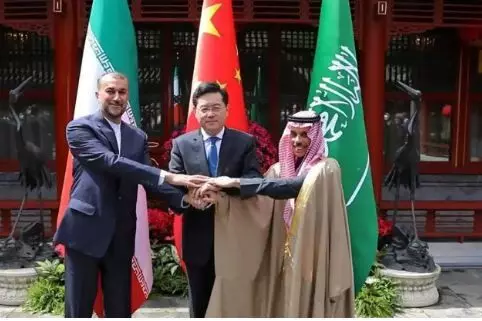
Saudi Arabia and Iran: New equations
text_fieldsThe rapprochement between long-time regional rivals Saudi Arabia and Iran has sent shock waves through the Middle East and dealt a symbolic blow to Israeli Prime Minister Benjamin Netanyahu. It was a threat posed by Tehran against Netanyahu’s public diplomacy and personal crusade. This breakthrough was the culmination of talks for more than a year in Baghdad and Oman and more recent talks in Beijing. Israel was then ensnared in internal politics, due to the public protests and so could not take notice of the awaiting diplomatic changes.
The agreement reestablished ties between Saudi Arabia and Iran, after seven years of diplomatic rupture. It broadly represents one of the most striking shifts in Middle Eastern diplomacy over recent years. In countries like Yemen and Syria, long caught between the Sunni kingdom and the Shiite powerhouse, the announcement stirred cautious optimism and relief. The agreement, according to an official of Biden administration, associates the Gulf countries with the malign axis of China and Russia that serves anti Western interests. But, officials in Biden administration themselves seem to realize that there have been complaints that the Gulf states,especially Saudi Arabia, considered the United States unreliable. Several documented field developments prove this deterioration.
The highly credible American Associated Press, which is close to the decision-making circle in the White House, had announced that the administration of US President Joe Biden had withdrawn all its missile defense systems - the “Patriot” and the most advanced “THAAD” - in 2021 which were installed in 2019 to protect Saudi's strategic goals, after the major and painful attack launched by the Houthi movement, "Ansar Allah", with missiles and drones, on Aramco's facilities, the backbone of their oil industry.
Consequently, the scheduled visit of US Defense Secretary, Lloyd Austin,was canceled. It was later that Saudi kingdom received Leonid Slutsky, head of international affairs in the Russian Duma, in a clear threat to Washington. This indicated that the Russian alternative was ready. It was a “courageous” but dangerous challenge to the United States. It was then, Prince Turki Al-Faisal, the former head of the Saudi intelligence service, appeared on CNBC’s screen wishing the United States to maintain its commitments towards the Kingdom by maintaining its missile systems, because the withdrawal of these missiles reflected “bad intention.” But, Washington did not take these indications seriously.
American analyst Christian Ulricht, confirmed that the United States had begun applying the "America First" theory and was abandoning its allies in the Gulf region, especially Saudi Arabia. Mr. Adel Al-Jubeir, the Saudi Minister of State for Foreign Affairs, was keen to take advantage of his country's representation at the climate summit held in the Egyptian resort of Sharm el-Sheikh in 2022 and announce the date of Chinese President Xi Jinping's visit to Saudi Arabia. The aim of the visit, according to him was to strengthen the trade ties and regional security, which occupied the top priorities of the two countries. It is noteworthy that the timing of this announcement surprised the observers as it coincided with the arrival of US President Joe Biden to Shar el-Sheikh to participate in the summit. In light of the tension in the Saudi-American relations on the ground of oil disputes, Mr. Al-Jubeir delivered a speech at the same summit giving a message to the American president that the kingdom had made up its mind, and wouldn't back down from heading east in its strategic relations with China, the future superpower. The Saudi authorities were then preparing an unprecedented reception for the Chinese President. Some Arab leaders such as Egyptian
President Abdel Fattah El-Sisi and Jordan's King Abdullah II were also invited for the event. China became the largest trading partner of the Kingdom of Saudi Arabia, and the partnership rose rapidly, as Saudi investments in China amounted to more than one hundred billion dollars, and Saudi exports (85 percent of which are oil) to China amounted to about 144 billion riyals, while imports amounted to about 45 billion riyals. That is, a surplus of about 90 billion riyals in favor of Saudi Arabia (3.75 riyals against the dollar). The Kingdom of Saudi Arabia maintained close relations with the second world power, Russia, and the Saudi-Russian coordination was manifested in its strongest form in the “OPEC Plus” agreement,which posed a challenge to US President Biden by reducing oil production by two million barrels per day, contrary to the desire of the United States and its European partners, and by strengthening the relationship with China.
By applying to join the 'BRICS ' and 'Shanghai ' organizations, Saudi further distanced itself from the West, and America in particular, though the official Saudi statements said otherwise. According to Arab strategic analysts, the Biden administration and the West, with the help of Israel adopted a conspiracy of dividing the Arab region into weak states fighting with each other, and they aimed at establishing an Arab-Western-Israeli front against the East led by China and Russia, including Iran. The Arab leaders realized this fact only very recently. Anyway, Russian military operation in Ukraine came to open the way for the Arab and Middle Eastern states to exit from under the umbrella of America and the West towards the East. It ushered in a new phase, in which the features of the Middle East changed. Middle East wanted prosperity and development instead of ruin and destruction. Washington though sought to obstruct the rapprochement between China and the Middle East, as well as with Russia, was unable to do so, given the economic repercussions of the bankruptcy of some banks in the US, as well as its preoccupation with the Ukrainian crisis.
Netanyahu, was on an official visit to Italy, while the agreement was signed. He declined a request for comment and issued no immediate statement on the matter.In Israel, people were bitterly divided and gripped by mass protests over plans by Netanyahu’s far-right government to overhaul the judiciary. Politicians criticized that Netanyahu was focusing on his personal agenda at the expense of Israel’s international relations. Yair Lapid, the former prime minister and head of Israel’s opposition, denounced the agreement between Riyadh and Tehran as “a dangerous failure of the Israeli government’s foreign policy.” This is what happens when you deal with legal madness all day, instead of taking care of the hostility of Iran and strengthening relations with the U.S- he wrote on Twitter.
Reema Bandar Al- Saud, Saudi Arabia's ambassador to the United States snce 2019 wrote that It had been almost 80 years since the founder of of Saudi Arabia, King Abdulaziz, met with President Franklin D. Roosevelt to lay the foundation for a postwar Middle East. Since that day, the two countries worked together to defeat Soviet communism, guarantee global energy security, and contain a revolutionary Iran. Modern Saudi Arabia is barely recognizable, according to her, from how it once looked, even just five years ago. Now, it is a gal leader in energy, and an investor in sustainable development. It has hundreds of billions of dollars of investment in education, technology, economic diversification and green energy. It has launched a transformation agenda that has been unlocking the enormous potential of young men and women in Saudi Arabia.
Accordingly, the fundamental Saudi position is that Iran has no role in the Arab world. Thus, this agreement may remain a vector for Riyadh’s rearranged cooperation with the United States and the Western powers. Is Saudi Arabia choosing to deal with Iran with detached pragmatism? Turning the page on conflict with Iran will not be easy, according to the observers, even if the two countries respect the rules that they agreed on in Beijing. Riyadh needs to manage the complex link between Iran’s expectations for economic dividends from de-escalation with Saudi Arabia and the escalation of U.S.-led sanctions on Iran. Can Iran achieve these goals? It is only true that Iran has no ideological affinity with China, but it knows that the United States is their enemy and they have to find alternative great powers as allies for both strategic and economic reasons. I think that this is the real driver of Iran’s policy both toward China and Russia . It’s partially economic as China’s a big customer for Iran . But Iran has been somewhat disappointed that China doesn’t want to pick sides in the Middle East. Iran sells a lot of oil to China, but Saudi Arabia sells more, and so China has always looked at the Gulf region more like an economist would and less like politicians would. They want to be customers of everybody and they want a peaceful, nonviolent region where energy can flow from all the parties to them.
On the surface, it looks like the Iranians have a lot to gain from a deal with Saudi Arabia, as they continue to be generally isolated from the West and the Arab world and also without much hope of returning to the nuclear deal. Simon Henderson marked the deal as a win for Tehran and described it as a great step forward for the Iranian position in the Middle East. In addition, Henry Romeand Grant Rumley wrote that “Iran may perceive the agreement as a tacit endorsement of its current nuclear policy,” warning that if Tehran doubles down on its nuclear strategy, it will further alarm Western and Israeli officials. Anyway, as a part of the agreement, Saudi Arabia will “soften coverage on London-based media outlets funded by Saudis, which Tehran has depicted as the leading anti-regime instigator .
In brokering the deal, China showed that it could truly be a major player in the Middle East. According to Simon Henderson, “China is the Cupid that brought the two sides together,” as it played an important role in bringing Iran and Saudi Arabia to the table. Beijing has been stepping up in the region in other ways, including the hosting a summit of all the Gulf countries in the near future, using its economic might to ensure attendance. China has not only gained stronger allies in Saudi Arabia and Iran, but has succeeded in undermining Washington. Robert Satloff wrote that “having China midwife the deal is an extra slap to Washington.”
But the China-brokered agreement “does not signal a new Beijing-led order in the Middle East,” Henry Rome and Grant Rumley argued. Overall, it seems that in playing a pivotal role in the negotiations, China is looking to increase their influence in the region and strengthen alliances with key Gulf partners. Can it help establish a new power block under China and Russia?


























